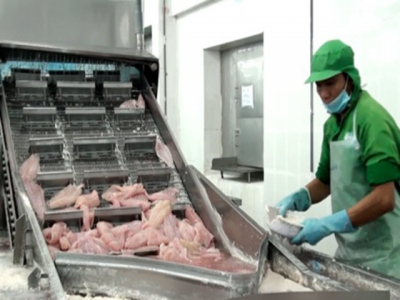Aquatic exports suffer from Chinese yuan depreciation

Aquatic exports to China are facing numerous difficulties in bouncing back and could only reach the highest turnover similar to 2018, according to the Vietnam Association of Seafood Exporters and Producers (VASEP).
Aquatic exports to China posted an annual drop of 5 per cent to US$239 million during the first quarter of 2019.
VASEP deemed yuan depreciation as one of the main causes for the slowdown export of aquatic products to the Chinese market.
Vietnam dong has appreciated against the Chinese yuan due to the Asian country’s increasing depreciation in response to the US-China trade war, thus pushing up the price of aquatic exports.
Aside from China’s tight border trade policy, aquatic exports are also faced with increasingly fierce competition from the similar products imported from India and Ecuador into China as these products, particularly shrimp, have the advantage of cheaper prices.
China emerges as a huge potential market for Vietnamese aquatic products, with its annual export turnover reaching more than US$1 billion.
Vietnam’s aquatic exports to China dropped by 5 per cent to US$1.2 billion in 2018 after recording a 50 per cent surge to record US$1.3 billion in the previous year. The downward trend remained during the first quarter of 2019 as the figure continued an annual drop of 5 per cent to US$239 million.
The country now has more than 150 businesses exporting aquatic products to China. Of which, 45 firms are dedicated to providing tra and basa fish categories while 50 specialize in shrimp products.
The sluggish export of aquatic products by many firms is hampering the country’s total export turnover of such items.
The ongoing trade war has made an adverse influence on China’s aquatic product trade, hence causing chaos in supply and demand. An upward trend has persisted for China’s import of cheap Indian shrimp products rather than similar items from Vietnam, thus leading to consecutive plunges in the Southeast Asian country’s shrimp exports since 2018.
Có thể bạn quan tâm
 Mitsui & Co to invest in Vietnamese shrimp producer Minh Phú
Mitsui & Co to invest in Vietnamese shrimp producer Minh Phú Japan's Mitsui & Co Ltd has agreed to acquire a 35.1 per cent of stake in Minh Phú Seafood Joint Stock Company, the world’s biggest shrimp integrator from farmi
 Shark catfish exports to US, China fall
Shark catfish exports to US, China fall Exports of Mekong Delta shark catfish to the US and China, two of the biggest buyers of the products, have dropped compared to the figure last year.
 Ethanol waste proves its worth in bass feed
Ethanol waste proves its worth in bass feed Waste grains from the ethanol production sector can improve the growth rates and FCRs of sea bass, according to new research.